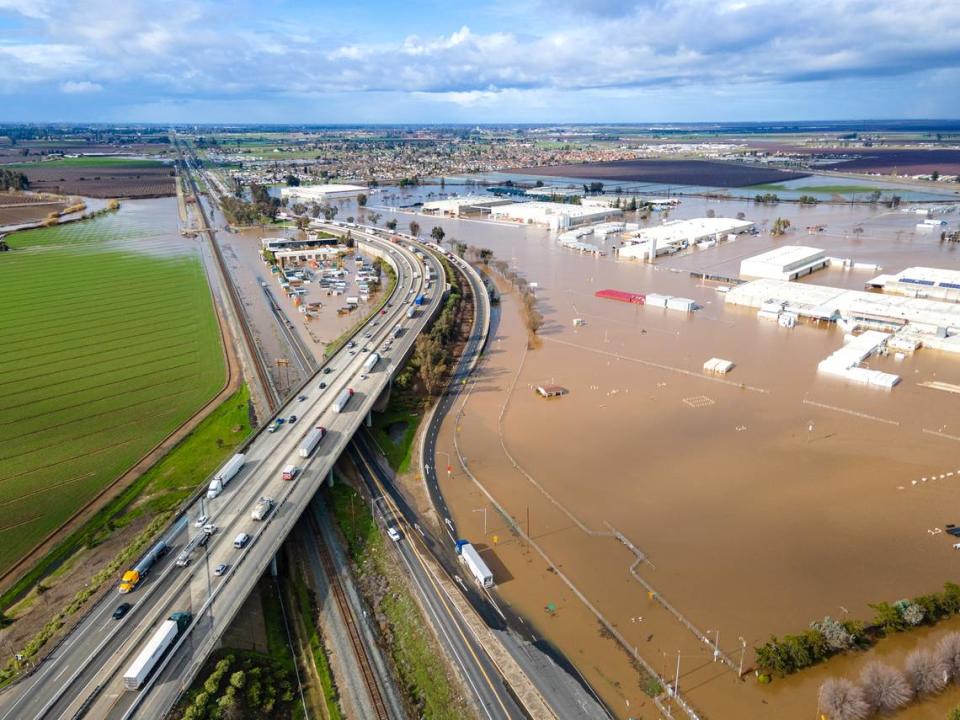California flood victims move toward suing government agencies over ‘preventable disaster’
One resident said he lost “everything” in the January floods that caused widespread damage in California. A pistachio farmer said “there’s no doubt” thousands of his trees aren’t bearing fruit as a result of the floodwaters. A local bakery owner said he spent $20,000 to replace coolers and baking ingredients.
They are just three of the 250 Merced County households and businesses that are taking steps toward suing local and state government entities over what they say was negligence in maintaining the area waterways.
Six months after a series of winter atmospheric rivers brought a deluge of rain that overwhelmed local water infrastructure, causing one creek to breach and flood the entire town of Planada, rural Merced County residents say they want accountability and compensation for the damages they incurred.
“This was a preventable disaster,” said co-lead plaintiff attorney Shant Karnikian. “This is something that these government entities should have been prepared for.”
The individuals have filed claims against the city of Merced, city of Atwater, county of Merced and Merced Irrigation District. Residents also filed claims against the California Department of Fish and Wildlife, which they allege prevented local entities from performing essential maintenance work.
This is the required first step before claimants can pursue litigation against public entities under state law. The agencies have 45 days to respond to the claimants before they can pursue their individual cases.

One claim, reviewed by The Fresno Bee, alleges that Merced County, “intentionally, knowingly, carelessly and negligently performed substandard maintenance, operation, control, and repair of the Merced Channels.” Similar claims were filed against the local cities, MID and the state.
Claimants are alleging a number of damages, such as: destruction and loss of private property; cost of mitigation, remediation, repair, and rebuilding property; decreased property value; loss of business assets, livestock, crop, crop yields and loss of business income and revenues; personal injuries and emotional distress; evacuation costs and more.
A state spokesperson for the Department of General Services, the state agency that would have received the claims, did not respond to requests for comment.
Jennifer Flachman, a spokesperson for the city of Merced, said in an email statement to The Bee that the city does not comment on potential litigation. A spokesperson for MID said they’ve received the claims and they are under review. The city of Atwater didn’t immediately respond to requests for comment.
Mike North, a spokesperson for Merced County, said in an email statement to The Bee that it is not the county’s practice to comment on potential or pending litigation, but that the county “continues to maintain its razor-sharp focus on helping our communities recover from the unprecedented weather events earlier this year.”
Merced County resident says “we lost everything” in flood
On the morning of January 10, Tony Borba’s wife woke up at 2:30 a.m., looked out the window and saw water across their two-acre property. She woke up Borba to alert him.
“As I was getting up, the water was coming in my front door,” said Borba, a resident of the unincorporated Merced County community of McSwain. He is one of the claimants pursuing litigation.
He had to act fast to transport his adult son with disabilities to another son’s home in Atwater.
“My first thought was to get him out,” he said. Borba helped get his son into his wheelchair, and then went to fetch the van in the carport, and saw “the water was already coming up through it.”
“If I hadn’t gotten him out (right then),” he said, “I don’t know what I would’ve done to get him out, because I can’t carry him.”
Borba said it took five months to repair his home from the damage, and estimates he spent nearly $200,000 on repairs and new furniture. He said the Federal Emergency Management Agency offered him $10,000 on the condition that he purchase flood insurance for the rest of his life. But he declined the help.
Now, he’s filing a claim, “to try to get my money that I put into the house back,” he said. “That’s my main concern.”
Another claimant, John McCorry – a pistachio farmer whose family has been farming in the Valley since the 1880s – said the floodwaters devastated about half of his 10,000 trees, which he grows on a hundred acres of farmland east of Planada.
“It’s pretty obvious, even to an untrained eye,” he said.
About 40% of his land flooded during January’s rains, McCorry said, a situation he says should have been preventable if there had been better maintenance of the creeks.
“If it would have been cleaned,” McCorry said, “I think there wouldn’t have been a problem.”
A 2012 analysis of flood infrastructure prepared in Merced County said that “the region’s extensive canal system is vulnerable to failure, more so during excessive storm events due to a lack of significant flood control improvements.”
McCorry said part of the problem is that local channels such as Mile Creek had an overgrowth of trees “six to eight inches in circumference,” as well as “a lot” of Tule reeds.
In videos of McCorry’s trees, shared with The Bee, some of the flood-damaged trees look bare with spare leaves and little to no fruit, while the unharmed trees look lush, green and full of nuts. He’s working with a team at UC Davis to diagnose his trees, which he believes have some kind of root rot or a fungal disease, verticillium wilt.
McCorry said prior to the floods, he expected a 2,500 to 3,000-pound crop this year. Now, he’s expecting closer to 1,000 to 1,500 pounds.
“At this point,” he said, “we really won’t know how much the damage is, you know, crop-wise, production-wise, until we go to harvest.”
Planada resident pursues lawsuits against governments
Residents of Planada – the unincorporated town of 4,000 that was completely submerged after the Bear Creek levee broke – are particularly interested in a lawsuit, Karnikian said.
“The response from the community, especially in the Planada neighborhood,” he said, was “this may be our only shot at trying to get some semblance of compensation for what happened.”
The state of California recently budgeted $20 million for Merced County to help with ongoing recovery efforts in Planada.
For Planada resident and business owner Luis Villagomez, 71, the recovery has been difficult. Villagomez and his wife, Estela, 69, have run the El Gallito Bakery in Planada for over 20 years.

The January flood destroyed the bakery’s industrial freezers, some furniture, and the flour, sugar and butter used to make their assortment of pan dulces, or sweet breads.
“It was a mess,” he said, “We had to throw everything away.”
El Gallito had to close for about three weeks as they cleaned and made repairs. They lost weeks of business and had to cancel multiple orders, including for one of their biggest clients, UC Merced.
Villagomez estimates they spent about $20,000 on the new freezers and baking ingredients, which they paid for using credit cards and with the help of a GoFundMe fundraiser.

“It is a small business,” Villagomez said, “we survive day to day.”
He hopes by pursuing litigation, he’ll be able to recuperate some funds to help his family recover – “and move forward.”
What’s next for claimants?
Karnikian said in an interview with The Bee that not all of the entities that received a claim will necessarily face a lawsuit.
“Part of the challenge here is figuring out exactly who was responsible or how much their actions or inactions contributed to losses sustained by these people and that contributed to the flooding,” he said. “Right now, folks are pointing the finger at each other.”
While the investigation is ongoing, Karnikian said if they don’t receive a response from the respective agencies within the 45-day time frame, “the plan would be to pursue a lawsuit against them.”
He expects lawsuits to be filed within the next six months.

